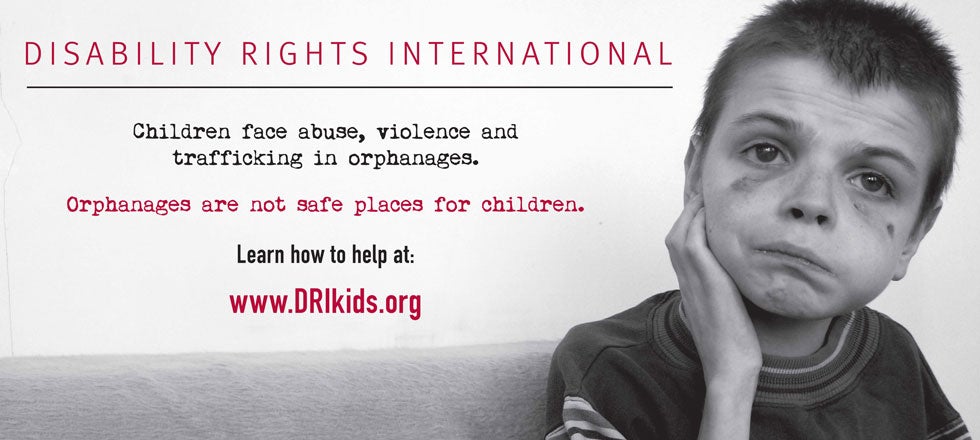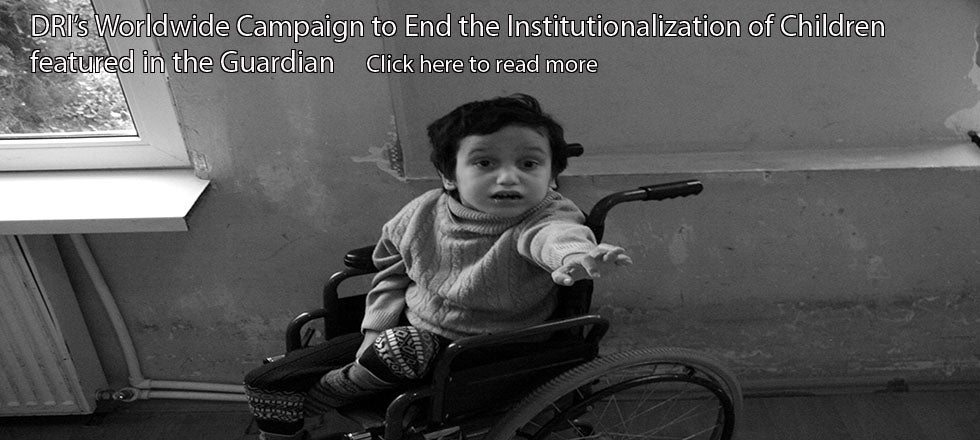
Image courtesy of Disability Rights International.
In our turbulent and oft troubled world, with new threats to people’s rights and health coming at us quickly, whether a new epidemic or a policy against immigrants or refugees that comes with great health costs, it is too easy to forget some of the long persisting health and human rights crises, particularly those that have always seemed forgotten, hidden away. Few such crises are more horrific than the institutionalization of children.
Worldwide, up to 8 million children live (often, if barely) in orphanages, which have been dubbed “dumping grounds for poor children and those with disabilities.” Almost all of these children, more than 90%, have at least one living parent. In these orphanages, the children are often neglected, abused, and denied medical care. Even when they are treated well, children housed in these institutions experience lasting psychological damage and developmental delays. They are simply no place for children. Yet, once placed in an institution, they will often never know life outside of its cold confines.
In Ukraine, for example, where “orphanages are a gateway to lifelong institutionalization in abusive adult facilities” – still more the rule rather than an exception around the world – abuse is rife. As Disability Rights International reported in 2015, “Children with disabilities are…often relegated to the most barren and filthy sections of institutions, left without activities, stimulation or human contact. Many children are left in physical restraints or kept in beds and cribs where their arms and legs atrophy from disuse….children are subject to beatings, rape, and other forms of routine violence.”
The complete loss of liberty, the total control over their lives by the institution (and at times legal guardianship by the state or institution), and the abuse of these children, make their institutionalization akin to slavery, effectively the property of the institution. Even if not legally owned by state or institution, for these children, that is a distinction without a difference. And sometimes, as with slavery, the children are forced into labor. In Ukraine, forced labor among institutionalized children is common, including of the most exploitive sort: sex trafficking, pornography, and sale of bodily organs. One former orphanage resident related: “In Andrey-Ivanovo institution the children were forced to work in the field from 6 am to 6 pm. Sometimes staff members took children home to help in the house and in the fields.”

Image courtesy of Disability Rights International. The Guardian are from September 26, 2016, is here.
As readily apparent, the institutionalization of children represents a massive violation of their rights, from health and education to freedom from torture and cruel, inhuman, or degrading treatment. Beyond this, institutionalization is directly at odds with Article 19 of the International Convention on the Protection and Promotion of the Rights and Dignity of Persons with Disabilities, which provides for “the equal right of all persons with disabilities to live in the community, with choices equal to others.” The Convention (Article 7) further requires that “[i]n all actions concerning children with disabilities, the best interests of the child shall be a primary consideration,” and “that children with disabilities have the right to express their views freely on all matters affecting them, [and that] their views be[] given due weight in accordance with their age and maturity.”
The Committee on the Right of Persons with Disabilities has affirmed that the treaty demands the deinstitutionalization of children. In its concluding observations on Guatemala last September, the Committee recommended that the country “[e]stablish the legal basis and financial support necessary to ensure that all children with disabilities are able to live in a family setting and to exercise their right to inclusive local services for children.” Earlier, in 2009, the United Nations’ called for the “progressive elimination” of institutionalization of children in its Guidelines for the Alternative Care of Children.
Institutionalization is often facilitated by international aid agencies, as in Guatemala and Ukraine. In the latter, along with agencies, including private organizations, a $20 million World Bank loan on reforming the country’s institutional care did require closing institutions and moving children to family settings, but only this condition only applied to children without disabilities. “However, for children with disabilities, the World Bank program seeks only to rebuild and renovate institutions and improve services within the segregated service system.”
Yet the disabilities rights treaty (article 32) commits states, in their international cooperation, to “support…national efforts for the realization of the purpose and objectives of the present Convention.” As we have seen, the institutionalization of children directly undermines the objectives of the treaty in virtually every way conceivable. Given the negative health impacts of institutions on children even where facilities are not abusive, international assistance that supports children’s institutionalization, rather than family and community living, also contravenes the requirement that states do not undermine the right to health, or other rights, extraterritorially.
The current state of international law as defined in the Maastricht Principles on Extraterritorial Obligations of States in the Area of Economic, Social and Cultural Rights prohibits states from actions (or omissions) where “nullification or impairment [of an economic, social, or cultural right] is a foreseeable result of their conduct. Uncertainty about potential impacts does not constitute justification for such conduct.” European Union regulations now prohibit development assistance through the European Social Fund from “support[ing] any action that contributes to segregation or to social exclusion.” USAID lacks such an absolute ban, though in 2012, the Senate Committee on Appropriations directed USAID to “rigorously implement its Disability Policy, which calls for community integration and full participation in society of people with disabilities, and ensure that USAID staff is properly trained.”
Disability Rights International has launched a Worldwide Campaign to End the Institutionalization of Children, devoted to ending the institutionalization of children. It is far past time to set millions of children free, to provide them the services required to enable children to remain with their families or in other family-like settings in the community, and to let children again be children, with lives of joy and roads of promise before them.



